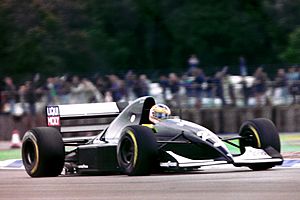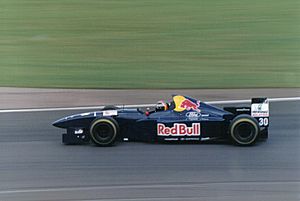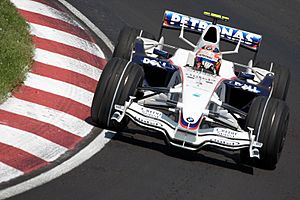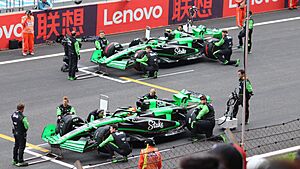Sauber Motorsport facts for kids
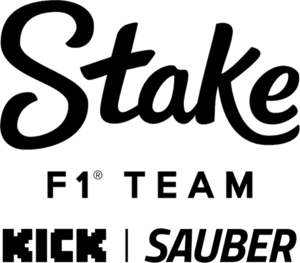 |
|
| Full name | Stake F1 Team Kick Sauber |
|---|---|
| Base | Hinwil, Zürich, Switzerland Bicester, Oxfordshire, United Kingdom (Technology Centre) |
| Team principal(s) | Jonathan Wheatley |
| Chief Technical & Operating Officer | Mattia Binotto |
| Technical director | James Key |
| Founder(s) | Peter Sauber |
| Previous name | Alfa Romeo F1 Team |
| Next name | Audi F1 Team |
| Formula One World Championship career | |
| First entry | 1993 South African Grand Prix |
| Last entry | 2025 Singapore Grand Prix |
| Races entered | 465 (462 starts) |
| Engines | Sauber, Mercedes, Ford, Petronas, BMW, Ferrari |
| Constructors' Championships |
0 |
| Drivers' Championships |
0 |
| Race victories | 1 |
| Podiums | 27 |
| Points | 865 |
| Pole positions | 1 |
| Fastest laps | 5 |
| 2024 position | 10th (4 pts) |
Sauber Motorsport AG, known today as Kick Sauber, is a Swiss company that builds and races cars. It was started by Peter Sauber in 1970. The team first built sports cars for racing, then joined Formula One in 1993.
Sauber had a strong partnership with Mercedes-Benz in sports car racing, winning two world championships and the famous 1989 24 Hours of Le Mans race. In Formula One, they were owned by BMW from 2006 to 2009. During this time, as BMW Sauber, they achieved their only Formula One win with Robert Kubica at the 2008 Canadian Grand Prix. They also finished second in the 2008 World Constructors Championship.
After BMW left, Peter Sauber bought the team back. From 2010 to 2023, they used Ferrari engines. They also had a big sponsorship deal with Alfa Romeo from 2018 to 2023, racing as Alfa Romeo Racing and later Alfa Romeo F1 Team. In 2022, they had their best result in over a decade, finishing sixth in the Constructors' Championship.
Sauber is now preparing to become the official factory team for Audi in Formula One starting in 2026. This means Audi will fully own and run the team.
Contents
Sauber's Early Racing Cars
|
Formerly
|
PP Sauber AG Red Bull Sauber AG BMW Sauber AG |
|---|---|
| Private | |
| Industry | Motor racing |
| Founded | 1970 |
| Founder | Peter Sauber |
| Headquarters | Hinwil, canton of Zürich, Switzerland |
|
Key people
|
Gernot Döllner (Chairman) Jonathan Wheatley (Team Principal) Mattia Binotto (CEO) Iñaki Rueda (Sporting Director) Xevi Pujolar (Racing Director) Beat Zehnder (Director of Signature Programs & Operations) |
| Owner | Audi AG (70%) QIA (30%) |
Peter Sauber started building sports cars in his garage in Zurich in 1970. His first car was called the Sauber C1. The "C" in the car names was chosen to honor his wife, Christiane. All Sauber cars since then have had a name starting with "C".
Sauber began working with Mercedes-Benz in 1985. They introduced the very successful Sauber C9 car in 1987. By 1988, Sauber became the official Mercedes factory team, known as Team Sauber Mercedes. With famous drivers like Michael Schumacher, they dominated the world championship in 1989 and 1990. A major highlight was winning the 1989 24 Hours of Le Mans race.
Sauber in Formula One
Sauber's First Era (1993–2005)
Starting with Mercedes-Benz (1993–1994)
Sauber joined Formula One in 1993. Their first F1 car was the Sauber C12, powered by Ilmor engines. The car looked great and performed well, scoring points in its very first race in South Africa. However, the team often faced reliability issues and accidents. Despite this, they still managed to finish seventh in the Constructors' Championship.
In 1994, Sauber officially became the Mercedes factory team, using Mercedes engines. The season was tough, especially after driver Karl Wendlinger had a serious crash at the 1994 Monaco Grand Prix. This accident, along with others that year, led to new safety rules in Formula One, like stronger head protection for drivers. Mercedes left Sauber at the end of 1994 to partner with McLaren.
Red Bull and Ford Engines (1995–1996)
In 1995, Sauber began a long partnership with energy drink company Red Bull. They also started using Ford engines. Driver Heinz-Harald Frentzen had a good season, helping the team score a record 18 points. In 1995, Petronas also became a major sponsor.
The 1996 season was more difficult for Sauber, even with a strong driver lineup. They scored fewer points, and at the end of the year, they decided to switch to Ferrari engines for the next season.
Working with Ferrari (1997–2005)
From 1997 to 2005, Sauber used engines and gearboxes designed by Ferrari. They even had Ferrari engineers working with them. In 2001, Sauber brought a young and unknown driver, Kimi Räikkönen, into Formula One. He proved to be very talented and later became a world champion.
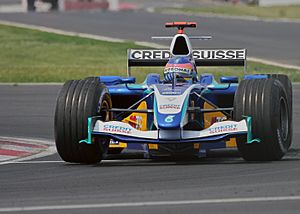
Sauber also invested a lot in new technology, building a modern wind tunnel and a powerful supercomputer to improve their cars. These advanced facilities made Sauber an attractive team for bigger car manufacturers. In 2005, Red Bull left Sauber to start their own team. Sauber then made a deal with BMW for engines, which led to BMW buying the team at the end of 2005.
BMW Factory Team (2006–2009)
A New Era with BMW (2006–2007)
At the end of 2005, BMW bought most of Sauber's shares, and the team was renamed BMW Sauber. Peter Sauber kept a small part of the team. For the 2006 season, the team signed Nick Heidfeld and Jacques Villeneuve, with Robert Kubica as a test driver. BMW built new V8 engines for the team.
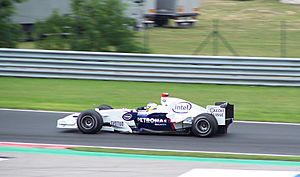
The team scored points regularly in 2006. Heidfeld achieved BMW Sauber's first podium finish at the 2006 Hungarian Grand Prix. Kubica replaced Villeneuve later in the season and also scored a podium at the 2006 Italian Grand Prix. The team finished fifth in the Constructors' Championship.
In 2007, Kubica and Heidfeld continued as drivers. The new car, the F1.07, showed good speed. Heidfeld had several strong fourth-place finishes. Kubica had a big crash in Canada but recovered quickly. Young driver Sebastian Vettel filled in for Kubica at one race and became the youngest driver to score a point at that time. BMW Sauber established itself as the third-best team behind Ferrari and McLaren.
First Win and Challenges (2008–2009)
The 2008 season started well for BMW Sauber. Kubica achieved the team's first ever pole position in Bahrain. The team's biggest success came at the 2008 Canadian Grand Prix, where Robert Kubica won the race, and Nick Heidfeld finished second. This was the team's first and only Formula One victory.
After this win, the team decided to focus on developing their car for the 2009 season due to new rules coming in. This meant they didn't improve as much during the rest of 2008, and other teams caught up. Despite this, Kubica remained in the championship fight for a long time.
The 2009 season was disappointing. The team struggled with the new rules and didn't perform as well as expected. In July 2009, BMW announced they would leave Formula One at the end of the season due to the global financial crisis. Peter Sauber bought the team back for a symbolic amount.
Sauber's Independent Return (2010–2018)
Back with Ferrari Engines (2010–2017)
In 2010, Peter Sauber officially repurchased the team. They continued to use Ferrari engines. Kamui Kobayashi and Pedro de la Rosa were the drivers. The team struggled at first but improved in the second half of the season, scoring points regularly. Kobayashi's impressive driving, especially in Valencia, earned him praise.
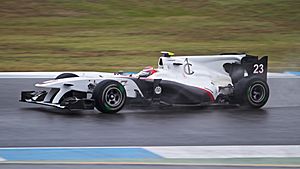
For 2011, Kobayashi was joined by Sergio Pérez. The team continued to score points and finished seventh in the Constructors' Championship.
The 2012 season was very successful for Sauber as an independent team. Pérez achieved two second-place finishes and a third place, showing great skill. Kobayashi also got his first podium finish in Japan. The team finished sixth in the Constructors' Championship, their best result since BMW left. During this year, Peter Sauber transferred ownership of a third of the team to CEO Monisha Kaltenborn, who later became the team principal.
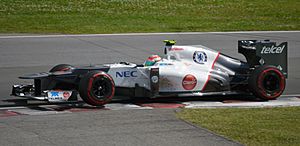
In 2013, Nico Hülkenberg and Esteban Gutiérrez joined the team. The car was not as competitive as the previous year, but Hülkenberg showed strong performances, especially in qualifying. The team finished seventh in the Constructors' Championship.
The 2014 season was very difficult. The team failed to score any points, which was a first in their history.
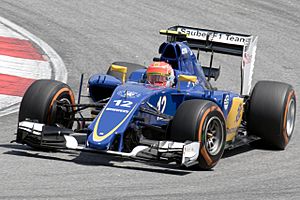
In 2015, Marcus Ericsson and Felipe Nasr became the drivers. The team improved significantly, scoring points in the first race and finishing eighth in the Constructors' Championship.
The 2016 season was tough again, with only two points scored by Felipe Nasr in Brazil. In July 2016, a Swiss investment firm called Longbow Finance bought Sauber, ending Peter Sauber's ownership.
For 2017, Ericsson stayed, and Pascal Wehrlein joined. The team struggled again, scoring only five points. Frédéric Vasseur took over as team principal during the season.
Partnership with Alfa Romeo (2018)
In 2018, Sauber formed a major partnership with Alfa Romeo, and the team was renamed Alfa Romeo Sauber F1 Team. They continued to use Ferrari engines. Charles Leclerc and Marcus Ericsson were the drivers.
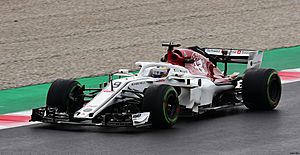
Leclerc, a rookie, showed great talent, scoring points regularly and helping the team finish eighth in the Constructors' Championship with 48 points. This was a big improvement for Sauber. At the end of the season, Leclerc moved to Ferrari.
Alfa Romeo Racing/F1 Team (2019–2023)
Racing as Alfa Romeo (2019–2021)
In 2019, the team officially became Alfa Romeo Racing. Kimi Räikkönen joined the team, partnering with Antonio Giovinazzi. The team had a good season, scoring 57 points and finishing eighth in the Constructors' Championship. A highlight was a strong race in Brazil, where both cars finished in the top five.
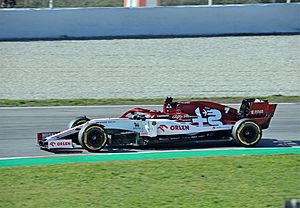
The 2020 season was more challenging, with the team only scoring eight points, but they still managed to finish eighth. In 2021, Alfa Romeo finished ninth with 13 points.
Final Years as Alfa Romeo (2022–2023)
For the 2022 season, former Mercedes driver Valtteri Bottas and rookie Zhou Guanyu joined the team, which was now called Alfa Romeo F1 Team. Bottas had a strong season, finishing fifth at one race and tenth overall in the drivers' standings. Zhou also scored points in three races. The team finished sixth in the Constructors' Championship, their best result in a decade.
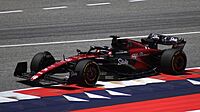
Sauber ended its partnership with Alfa Romeo at the end of 2023. Bottas and Zhou remained as drivers. The team signed new title sponsors, online casino Stake.com and streaming platform Kick. In countries where gambling ads are not allowed, the team was known as Alfa Romeo F1 Team Kick.
Stake F1 Team Kick Sauber (2024–2025)
Recent Seasons (2024–2025)
In 2024, Sauber officially lost its Alfa Romeo sponsorship as it prepared to become the Audi factory team. The team raced as Stake F1 Team Kick Sauber, continuing its partnerships with Stake and Kick. The 2024 car was named the Kick Sauber C44. The team finished the 2024 season in tenth place, scoring four points.
For the 2025 season, Nico Hülkenberg returned to the team, joined by reigning Formula 2 Champion Gabriel Bortoleto. Jonathan Wheatley became the new Team Principal on April 1, 2025. In February 2025, Sauber announced a new 'technical centre' in Bicester, United Kingdom, to help with recruitment and expand their presence in Formula One. At the 2025 British Grand Prix, Hülkenberg achieved his first ever Formula One podium, finishing third. This was also Sauber's first podium since 2012.
Audi Factory Team (from 2026)
On October 26, 2022, it was announced that Sauber will become the official Audi factory team starting in 2026. Audi will provide its own power units, ending Sauber's long-standing engine partnership with Ferrari. Audi acquired a minority stake in Sauber in January 2023 and confirmed a full takeover of the team on March 8, 2024. Mattia Binotto became the team principal on August 1, 2024, and Jonathan Wheatley joined as team principal on April 1, 2025.
Sauber Academy
In 2018, Sauber started a program called the Sauber Junior Team to help young drivers develop their skills. In 2020, this program was relaunched as the Sauber Academy, continuing to support future racing stars.
Race Cars
| Overview of Sauber race cars | |||
|---|---|---|---|
| Year | Car | Image | Category |
| 1970 | Sauber C1 | 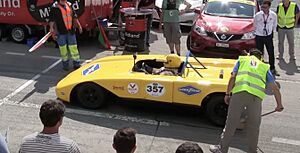 |
Group 6 |
| 1971 | Sauber C2 | 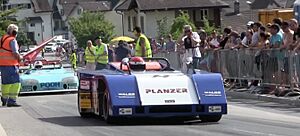 |
Group 6 |
| 1973 | Sauber C3 | 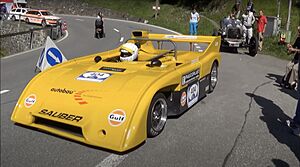 |
Group 5 |
| Sauber C4 | Group 5 | ||
| 1975 | Sauber C5 | 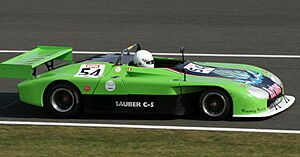 |
Group 6 |
| 1982 | Sauber SHS C6 | 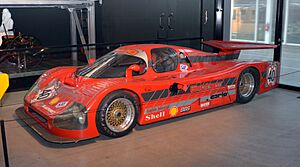 |
Group C |
| 1983 | Sauber C7 | Group C | |
| 1985 | Sauber C8 | 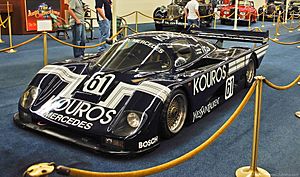 |
Group C1 |
| 1987 | Sauber C9 | 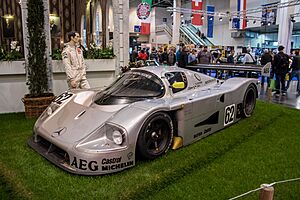 |
Group C1 |
| 1991 | Mercedes-Benz C11 | 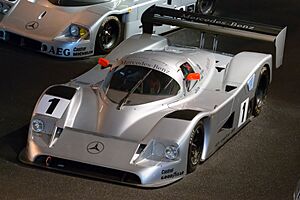 |
Group C2 |
| Mercedes-Benz C291 | 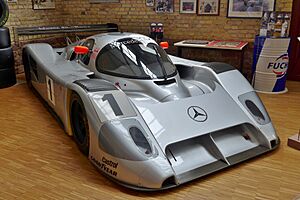 |
Group C1 | |
| Mercedes-Benz C292 | 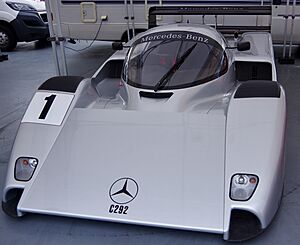 |
Group C1 | |
| 1993 | Sauber C12 | 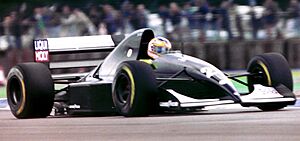 |
Formula One |
| 1994 | Sauber C13 | 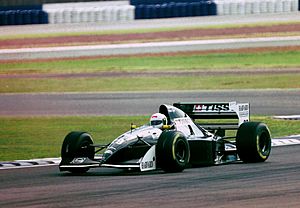 |
Formula One |
| 1995 | Sauber C14 | 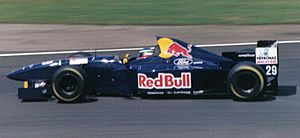 |
Formula One |
| 1996 | Sauber C15 | 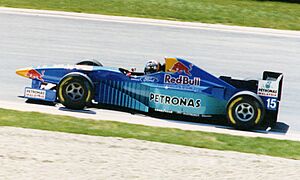 |
Formula One |
| 1997 | Sauber C16 | 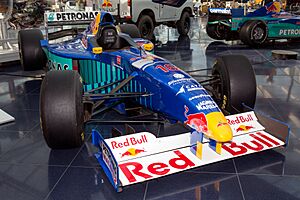 |
Formula One |
| 1998 | Sauber C17 | 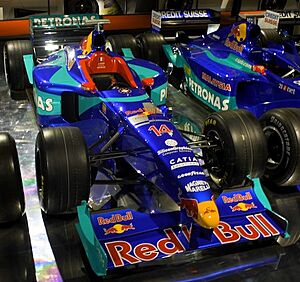 |
Formula One |
| 1999 | Sauber C18 | 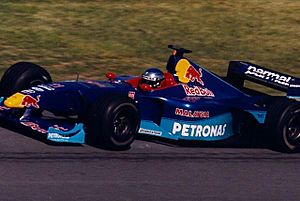 |
Formula One |
| 2000 | Sauber C19 | 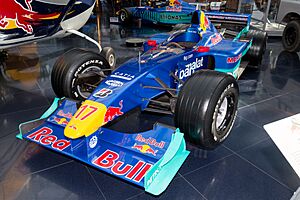 |
Formula One |
| 2001 | Sauber C20 | 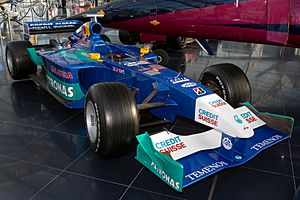 |
Formula One |
| 2002 | Sauber C21 | 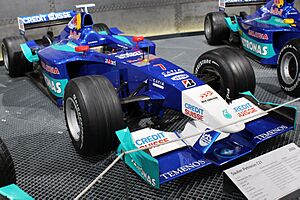 |
Formula One |
| 2003 | Sauber C22 | 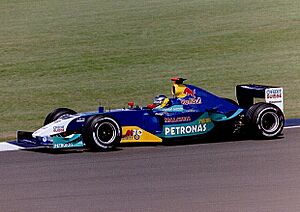 |
Formula One |
| 2004 | Sauber C23 | 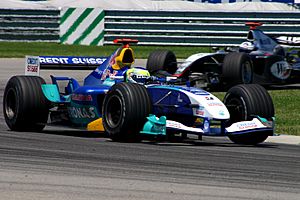 |
Formula One |
| 2005 | Sauber C24 | 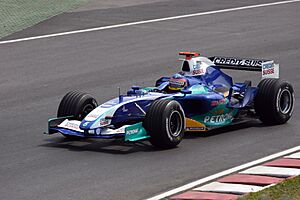 |
Formula One |
| 2006 | BMW Sauber F1.06 | 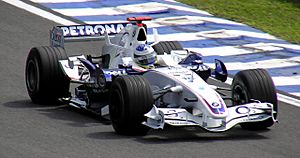 |
Formula One |
| 2007 | BMW Sauber F1.07 | 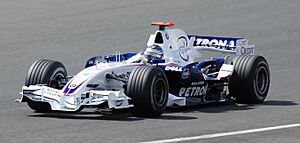 |
Formula One |
| 2008 | BMW Sauber F1.08 | 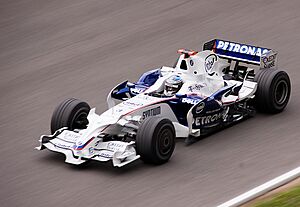 |
Formula One |
| 2009 | BMW Sauber F1.09 | 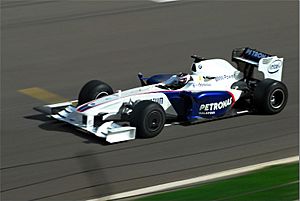 |
Formula One |
| 2010 | Sauber C29 | 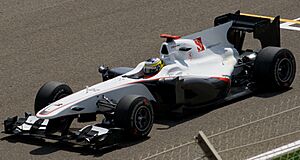 |
Formula One |
| 2011 | Sauber C30 | 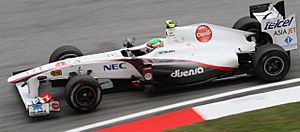 |
Formula One |
| 2012 | Sauber C31 | 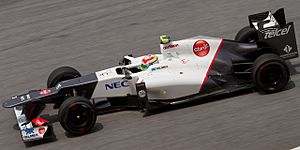 |
Formula One |
| 2013 | Sauber C32 | 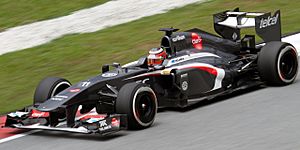 |
Formula One |
| 2014 | Sauber C33 | 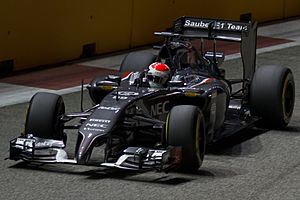 |
Formula One |
| 2015 | Sauber C34 | 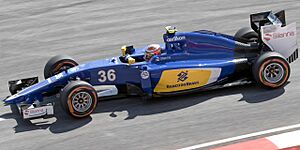 |
Formula One |
| 2016 | Sauber C35 | 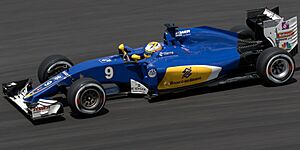 |
Formula One |
| 2017 | Sauber C36 | 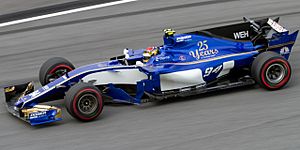 |
Formula One |
| 2018 | Sauber C37 | 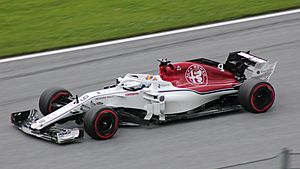 |
Formula One |
| 2019 | Alfa Romeo Racing C38 | 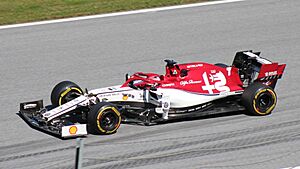 |
Formula One |
| 2020 | Alfa Romeo Racing C39 | 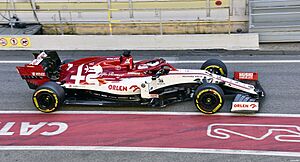 |
Formula One |
| 2021 | Alfa Romeo Racing C41 | 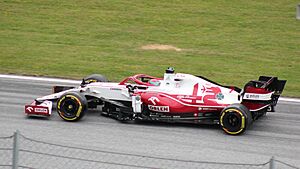 |
Formula One |
| 2022 | Alfa Romeo C42 | 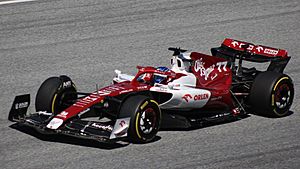 |
Formula One |
| 2023 | Alfa Romeo C43 | 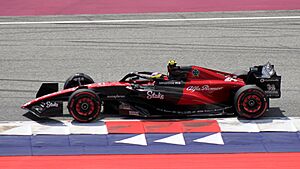 |
Formula One |
| 2024 | Kick Sauber C44 | 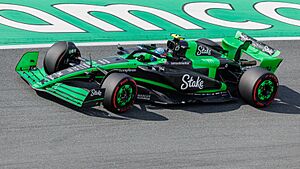 |
Formula One |
| 2025 | Kick Sauber C45 | 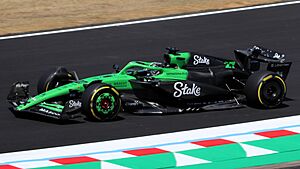 |
Formula One |
Racing Record
| Formula One results | ||||||||
|---|---|---|---|---|---|---|---|---|
| Year | Name | Car | Engine | Tyres | No. | Drivers | Points | WCC |
| Sauber | ||||||||
| 1993 | C12 | Sauber 2175A 3.5 V10 | G | 29. 30. |
12 | 7th | ||
| 1994 | C13 | Mercedes 2175B 3.5 V10 | G | 29. 29. 29. 30. |
12 | 8th | ||
| 1995 | C14 | Ford ECA Zetec-R 3.0 V8 | G | 29. 29. 30. |
18 | 7th | ||
| 1996 | C15 | Ford JD Zetec-R 3.0 V10 | G | 14. 15. |
11 | 7th | ||
| 1997 | C16 | Petronas SPE-01 3.0 V10 | G | 16. 17. 17. 17. |
16 | 7th | ||
| 1998 | C17 | Petronas SPE-01D 3.0 V10 | G | 14. 15. |
10 | 6th | ||
| 1999 | C18 | Petronas SPE-03A 3.0 V10 | B | 11. 12. |
5 | 8th | ||
| 2000 | C19 | Petronas SPE-04A 3.0 V10 | B | 16. 17. |
6 | 8th | ||
| 2001 | C20 | Petronas 01A 3.0 V10 | B | 16. 17. |
21 | 4th | ||
| 2002 | C21 | Petronas 02A 3.0 V10 | B | 7. 8. 8. |
11 | 5th | ||
| 2003 | C22 | Petronas 03A 3.0 V10 | B | 9. 10. |
19 | 6th | ||
| 2004 | C23 | Petronas 04A 3.0 V10 | B | 11. 12. |
34 | 6th | ||
| 2005 | C24 | Petronas 05A 3.0 V10 | M | 11. 12. |
20 | 8th | ||
| BMW Sauber | ||||||||
| 2006 | F1.06 | BMW P86/6 2.4 V8 | M | 16. 17. 17. |
36 | 5th | ||
| 2007 | F1.07 | BMW P86/7 2.4 V8 | B | 9. 10. 10. |
101 | 2nd | ||
| 2008 | F1.08 | BMW P86/8 2.4 V8 | B | 3. 4. |
135 | 3rd | ||
| 2009 | F1.09 | BMW P86/9 2.4 V8 | B | 5. 6. |
36 | 6th | ||
| 2010 | C29 | Ferrari 056 2.4 V8 | B | 22. 22. 23. |
44 | 8th | ||
| Sauber | ||||||||
| 2011 | C30 | Ferrari 056 2.4 V8 | P | 16. 17. 17. |
44 | 7th | ||
| 2012 | C31 | Ferrari 056 2.4 V8 | P | 14. 15. |
126 | 6th | ||
| 2013 | C32 | Ferrari 056 2.4 V8 | P | 11. 12. |
57 | 7th | ||
| 2014 | C33 | Ferrari 059/3 1.6 V6 t | P | 21. 99. |
0 | 10th | ||
| 2015 | C34 | Ferrari 060 1.6 V6 t | P | 9. 12. |
36 | 8th | ||
| 2016 | C35 | Ferrari 061 1.6 V6 t | P | 9. 12. |
2 | 10th | ||
| 2017 | C36 | Ferrari 061 1.6 V6 t | P | 9. 36. 94. |
5 | 10th | ||
| 2018 | C37 | Ferrari 063 1.6 V6 t | P | 9. 16. |
48 | 8th | ||
| Alfa Romeo | ||||||||
| 2019 | C38 | Ferrari 064 1.6 V6 t | P | 7. 99. |
57 | 8th | ||
| 2020 | C39 | Ferrari 065 1.6 V6 t | P | 7. 99. |
8 | 8th | ||
| 2021 | C41 | Ferrari 065/6 1.6 V6 t | P | 7. 88. 99. |
13 | 9th | ||
| 2022 | C42 | Ferrari 066/7 1.6 V6 t | P | 24. 77. |
55 | 6th | ||
| 2023 | C43 | Ferrari 066/10 1.6 V6 t | P | 24. 77. |
16 | 9th | ||
| Kick Sauber | ||||||||
| 2024 | C44 | Ferrari 066/12 1.6 V6 t | P | 24. 77. |
4 | 10th | ||
| 2025 | C45 | Ferrari 066/12 1.6 V6 t | P | 5. 27. |
* | * | ||
Notes
- * – Season still in progress.


